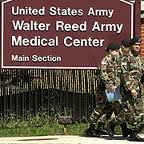
Life After War
Walter Reed National Military Medical Center Helps Soldiers Get Back to Living
By Tracy M. Fitzgerald
Maryland Physician
Each time a soldier arrives at Walter Reed National Military Medical Center after being injured in combat, Paul Pasquina, M.D., and his team develop a treatment plan to address much more than their patient’s physical needs. Here, there is as much focus on mental and emotional healing, for those whose lives may be forever changed by what they saw, heard and felt while at war. At Walter Reed, it’s about caring for the patient as a whole, and helping each get back to living and doing the things they enjoy the most.
“Every patient we see has different physical and emotional needs,” said Dr. Pasquina, Chief of the Department of Orthopedics and Rehabilitation at Walter Reed. “Some are here for as long as six month or even a year, undergoing multiple surgeries or rehabilitation. It’s important that we give our patients hope and make them realize they will be able to go on and enjoy the things they love in life, whether its sports and recreation, creative arts and just being able to go out in the community to do everyday activities like going to a ballgame, museum or movie theater.”
Recovering soldiers with a love for sports have been able to participate in activities ranging from skiing, kayaking, fishing and horseback riding to golf, cycling, swimming and basketball (and so many more). Others have gone down a more creative path, focusing on writing, painting or even learning how to play musical instruments. And on plenty of occasions, Walter Reed’s recreational therapists have organized group outings for patients to attend professional sports events, take tours of Washington D.C. or just hit the town for dinner and a movie. Pasquina says that without a doubt, keeping patients active can make a significant impact on their overall recovery process.
“These activities help patients with their physical recovery, but go a really long way to support their emotional wellbeing,” Dr. Pasquina said. “Making soldiers realize that they can return to their communities and giving them outlets to learn and experience new things is an extremely important part of our mission.”
Walter Reed partners with the U.S. Departments of Defense and Veterans Affairs, as well as various non-profit organizations, to make this program possible. Some organizations, such as Project Healing Waters, devote themselves entirely to supporting wounded military personnel and disabled veterans. Project Healing Waters is a national initiative that provides fly fishing, fly casting, fly typing and rod building classes at no cost to its participants. It’s one of many programs that has been well received by soldiers undergoing treatment at Walter Reed.
“It’s these types of activities that help our patients think ahead, rather than dwell on their injury or disability,” Dr. Pasquina said. “Our service members have told us that it helps them reset their goals and focus on moving forward.”
Having the opportunity to help and give back to those who have volunteered to serve America, willingly putting their lives on the line, is something that staff at Walter Reed consider a privilege, Pasquina included.
“Every day, I get to witness amazing resiliency and spirit as these patients take small steps to recover,” he said. “Seeing someone go on to do great things and be happy in life is something I cherish.”
Those interested in making a donation to support the continued growth and availability of recreational programs for wounded soldiers are encouraged to do so by visiting the Walter Reed Society web site at www.walterreedsociety.org.
This article post first appeared on Maryland Physician and is used with permission from the author.
